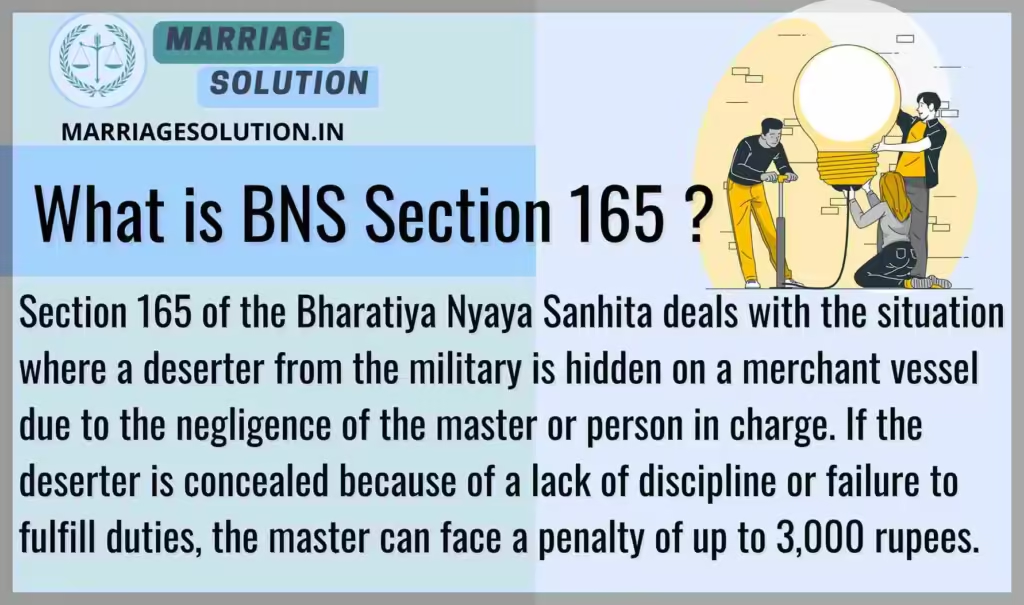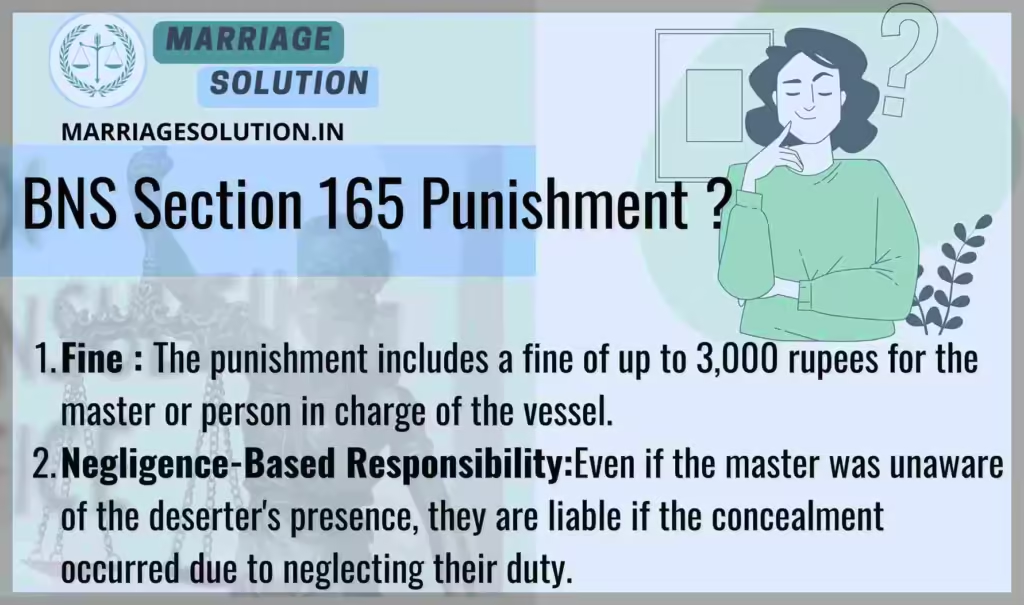Introduction of 165 BNS
Section 165 of the Bharatiya Nyaya Sanhita (BNS) deals with the liability of a ship’s master or person in charge of a merchant vessel if a deserter from the Indian Army, Navy, or Air Force is concealed on board due to negligence. Even if the master did not know about the deserter’s presence, they can still be fined if proper checks and discipline were not maintained.
This provision ensures discipline in merchant shipping and prevents deserters from escaping military justice by hiding on commercial vessels.
The Bharatiya Nyaya Sanhita (BNS) Section 165 replaces the old Indian Penal Code (IPC) Section 137.
What is BNS Section 165 ?
Section 165 of the Bharatiya Nyaya Sanhita deals with the situation where a deserter from the military is hidden on a merchant vessel due to the negligence of the master or person in charge. If the deserter is concealed because of a lack of discipline or failure to fulfill duties, the master can face a penalty of up to 3,000 rupees.

Deserter concealed BNS 165
Whoever, being the master or person in charge of a merchant vessel, allows any deserter from the Army, Navy, or Air Force of the Government of India to be concealed on such vessel through negligence or lack of discipline, shall be punished with fine which may extend to three thousand rupees.
1. Who is Covered?
This section applies to the master or person in charge of a merchant vessel (commercial ship). They hold the responsibility for ensuring that no military deserter is hidden on board.
2. What is the Offense?
- If a deserter from the Army, Navy, or Air Force is concealed on the ship, and
- The concealment happens due to negligence or lack of discipline of the master,
then it amounts to an offense under this section.
3. Knowledge Not Necessary
Even if the master does not actually know that a deserter is hiding, they are still liable if the concealment occurred because of their failure to maintain proper supervision and discipline.
4. Nature of Negligence
- Failure to check passengers or crew properly
- Careless supervision during inspections
- Not maintaining proper records or discipline on board
5. Punishment
- The master can be fined up to ₹3,000.
- No imprisonment is prescribed under this section.
6. Nature of the Offense
- Bailable → The accused can apply for bail.
- Non-Cognizable → Police cannot arrest without the Magistrate’s order.
- Non-Compoundable → The offense cannot be settled privately; trial must proceed in court.
- Trial by Any Magistrate → Lower courts can handle such cases.
Example Cases
Example 1:
A deserter from the Indian Army hides on a cargo ship. The master fails to inspect properly, and the deserter is later discovered. The master is fined under Section 165 for negligence.
Example 2:
A Navy deserter boards a trading vessel. The master had a duty to check but neglected inspection. Even though he didn’t know, he is liable and fined under this section.
Why BNS Section 165 is Important
- Ensures discipline in merchant shipping.
- Prevents military deserters from escaping justice.
- Imposes financial accountability on shipmasters.
- Strengthens coordination between civilian shipping and national defense.
Section 165 BNS Overview
BNS Section 165 of the Bharatiya Nyaya Sanhita makes the master or person in charge of a merchant vessel responsible if a deserter from the military is found hidden on the ship. Even if they don’t know about the deserter’s presence, they can be fined if the concealment happened due to negligence or a lack of proper discipline.
Key Points for BNS Section 165
- Focus on Deserters from the Military
BNS Section 165 is concerned with situations where individuals who have deserted from the Indian Army, Navy, or Air Force are found hiding on merchant ships. The section makes it clear that the concealment of such deserters on a vessel is a serious issue that needs to be addressed. - Master or Person in Charge Held Liable
The law specifically targets the master or the person in charge of the merchant vessel. If a deserter is found on the ship, the responsibility falls on the person managing the vessel. This includes anyone who is in command or has oversight over the ship’s operations. - Negligence or Lack of Discipline
For the master or person in charge to be penalized, there must be a level of negligence or failure in maintaining proper discipline. This means that if the master or person in charge could have reasonably discovered the deserter but failed to do so due to carelessness or poor management, they are considered liable. - Penalty is a Fine
The punishment for this offense is a financial penalty, not imprisonment. The fine can go up to 3,000 rupees. This reflects the seriousness of the offense, while also taking into account that the master might not have been directly aware of the deserter’s presence. - Ignorance Not an Excuse
The law does not accept ignorance as a defense. Even if the master did not know about the deserter, they are still responsible if the concealment could have been prevented with proper checks and discipline. This provision ensures that negligence in the management of the vessel is adequately penalized. - Non-Cognizable Offense
BNS Section 165 is categorized as a non-cognizable offense. This means that the police cannot arrest the person in charge without prior approval from a magistrate. It is typically less severe than cognizable offenses, but still significant. - Bailable Offense
The offense is bailable, meaning that if charged, the master can apply for bail and be released from custody while awaiting trial. This provision provides an opportunity for the accused to avoid detention during the legal process. - Non-Compoundable Offense
This is a non-compoundable offense, meaning it cannot be resolved through a settlement or agreement between the parties involved. The case must be decided in court, and the accused cannot simply pay a sum of money or make other arrangements to avoid legal proceedings. - Tried by a Magistrate
Cases under this section are handled by a Magistrate’s court, not by higher courts. The Magistrate will review the evidence and make a ruling based on the facts presented. This simplifies the legal process for less severe offenses. - Merchant Vessel Context
The section specifically applies to merchant vessels, which are ships used for commercial purposes rather than military ships. This ensures that the law targets commercial shipping operations and holds them accountable for failing to detect and manage deserters hiding on their vessels.
Example of BNS Section 165
Example 1:
Suppose a merchant ship traveling from Mumbai to Kolkata has a deserter from the Indian Army hidden on board. The ship’s master didn’t know about the deserter but failed to properly check the ship’s crew and passengers. Because of this negligence, the deserter stayed hidden on the ship. Under BNS Section 165, the master can be fined up to 3,000 rupees for this failure.
Example 2:
A deserter from the Indian Navy is found hiding on a merchant vessel. The ship’s master had a duty to inspect the vessel before departure but did not do so thoroughly. Due to this lack of discipline, the deserter went unnoticed. The master could be held responsible and fined under Section 165, even though they were unaware of the deserter’s presence.
BNS 165 Punishment
- Fine
The punishment includes a fine of up to 3,000 rupees for the master or person in charge of the vessel. - Negligence-Based Responsibility
Even if the master was unaware of the deserter’s presence, they are liable if the concealment occurred due to neglecting their duty.

BNS 165 bailable or not ?
Yes, BNS Section 165 is a bailable offense, meaning the accused can seek bail and not be held in custody while awaiting trial.
Comparison table – BNS Section 165 vs IPC 137
| Section | What it Means | Punishment | Bail | Cognizable? | Trial By |
|---|---|---|---|---|---|
| BNS Section 165 | Deals with negligence by the master or person in charge of a merchant vessel allowing a deserter from the armed forces to be concealed onboard. | Fine up to ₹3,000. | Bailable | Non-Cognizable | Any Magistrate |
| IPC Section 137 (Old) | Earlier law punishing a ship’s master who, through negligence, allowed a deserter to be concealed on a merchant vessel. | Fine up to ₹500. | Bailable | Non-Cognizable | Any Magistrate |
BNS Section 165 FAQs
What is BNS Section 165 about?
It deals with the offense of concealing deserters from the Indian military on merchant vessels due to the negligence of the ship’s master.
Who can be punished under Section 165?
The master or person in charge of a merchant vessel can be fined if a deserter is concealed due to their negligence.
Who handles cases under Section 165?
Cases are handled by a Magistrate.
Conclusion
BNS Section 165 highlights the responsibility of merchant vessel masters in preventing deserters from hiding on board. Unlike BNS Section 164, which punishes intentional harboring, this section punishes negligence that allows such concealment.
By raising the fine from the IPC’s ₹500 to ₹3,000, the BNS reflects modern accountability in shipping and emphasizes that negligence in handling deserters can harm national security. It strengthens both discipline in the armed forces and responsibility in the merchant navy sector.
Need Legal Support?
If you’re facing court proceedings, marriage-related issues, or any legal matter, our team at Marriage Solution – Lawyer Help is ready to guide you. Just complete our easy online enquiry form, and we’ll connect you with the right legal assistance tailored to your needs. helpful. By completing our enquiry form and submitting it online, we can provide customized guidance to navigate through the process.
Finished with BNS 165 ? Continue exploring the next provisions of the Bharatiya Nyaya Sanhita (BNS), 2023. Each section includes explanations, examples, and plain-language breakdowns for easy understanding.
- 166 BNS : Abetment of act of insubordination by soldier, sailor or airman.
- https://marriagesolution.in/bns_section/166-bns/
- 167 BNS : Persons subject to certain Acts.
- https://marriagesolution.in/bns_section/167-bns/
- 168 BNS : Wearing garb or carrying token used by soldier, sailor or airman.
- https://marriagesolution.in/bns_section/168-bns/
- Section 169 BNS : Candidate, electoral right defined.
- https://marriagesolution.in/bns_section/section-169-bns/
- 170 BNS : Bribery.
- https://marriagesolution.in/bns_section/170-bns/
Full IPC Section List: https://marriagesolution.in/ipc-section-list
All Indian Law & Blogs: https://marriagesolution.in/indian-law/
Full BNSS Section List: https://marriagesolution.in/bnss_section-list
